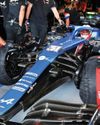
If you were to write down the basic criteria for designing a racecar and then developing it to stay ahead of the competition, it would be quite a short document. Racing cars are built to a specific size and weight, and they have a singular purpose; to win races. They are created to be as light as possible, as efficient as they can be in finding the perfect balance of power against downforce, and to make the most of whatever technologies are available.
But there’s a bit more to it than that. Designers and development engineers must also push the boundaries while staying within the regulations to produce a winning car, and it is this desire to stretch what’s possible, to build, prototype, test, and race innovative ideas that sets the racecar designer and engineer apart.
Crucially, speed is of the essence, and we are not talking about lap times here. Turnaround times for the development of new ideas is critical to success in motor racing. If competition occurs every two weeks on average (or even more regularly in NASCAR), then teams have to be adaptable and capable of rapid prototyping, development, analysis and delivery of reliable parts within a tight time-frame.
The sport is thus always full of new ideas that can be transferred far beyond just the modern cars that we drive out on the road – though that particular crossover still exists, of course. The internal combustion engine (ICE) has been the bedrock of our mobility for more than a century, but this has now changed and we are looking for other fuels and other sources of power to keep us mobile. Key to everything, though, is efficiency, and while that seems obvious when looking at power to weight ratios and downforce figures versus drag, it takes only a small step of the imagination to take that philosophy into other areas of life.
Battle tactics
Denne historien er fra Anatomy of a Racecar-utgaven av Racecar Engineering.
Start din 7-dagers gratis prøveperiode på Magzter GOLD for å få tilgang til tusenvis av utvalgte premiumhistorier og 9000+ magasiner og aviser.
Allerede abonnent ? Logg på
Denne historien er fra Anatomy of a Racecar-utgaven av Racecar Engineering.
Start din 7-dagers gratis prøveperiode på Magzter GOLD for å få tilgang til tusenvis av utvalgte premiumhistorier og 9000+ magasiner og aviser.
Allerede abonnent? Logg på
Talk the torque
More thoughts on in-wheel motors and their effects on twisting force
Rolling about
An explanation of the limitations of a previous load transfer article, bringing jacking forces into the mix
F1 breaks schedule records
The FIA has confirmed no fewer than 23 races on the 2022 Formula 1 World Championship schedule, the highest number of grands prix ever to be held in a single season, and that has led to criticism from some teams that will be on the road for eight months.

Under pressure
Toyota may have finished first and second at Le Mans this year, but the effort required to overcome a fuel delivery problem and finish with both cars was Herculean
Physics at work
Dutch company, Intrax, offers Racecar Engineering an insight into the technologies it employs to optimise its suspension products
Williams' 2030 ambition
Williams Racing has committed to becoming climate positive by 2030 as part of an all-new sustainability strategy.
Diff'rent strokes
Racecar looks at the different types of mechanical differential, their benefits and limitations
Das Boot
A curious Twitter exchange fired up a unique, hydrogen-powered, cross-country project that will contest the Baja 1000 in November 2022

Air born
Every racecar engineer's dream is a blank sheet of paper design. When Hoonigan and Subaru approached Vermont Sportscars about building the next generation of Gymkhana racer, that's just what the company was given

Remote control
Called variously ‘virtual garages’, ‘mission control’ or ‘race support rooms’ is the future of race engineering sitting in the warm back at HQ?